- Home
- Peter Straub
The Throat Page 3
The Throat Read online
Page 3
“Is that true?” I asked.
For a second, Ratman looked wrathful. I had challenged his system of belief, and I was a person who knew nothing.
Pirate came to my rescue. “How come you could remember seeing this guy get wasted, if you didn’t see it in the first place?”
“I was out of my body.”
“Goddamn it, Underdog,” said Picklock, and grabbed the handle of the heavy bag I had nearly dropped. “What the fuck is the matter with you?” Single-handedly, he tossed the bag into the shed behind us.
“Underdog, never drop the fucking bags,” said di Maestro, and deliberately dropped a bag onto the concrete. Whatever was inside it gurgled and splatted.
For a moment or two we continued to unload the bodies into the shed.
Then Ratman said, “Anyhow, about a second later I found out I was still alive.”
“What makes you think you’re alive?” asked Attica.
“On top of everything else, this guy shoves his face into mine, and for sure he ain’t no angel. I can see the goddamn canopy above his head. The birds start screeching again. The first thing I know for sure is Bobby Swett is gone, man—I’m wearing whatever’s left of him. And this guy says to me, ‘Get on your feet, soldier.’ I can just about make out what he’s saying through the ringing in my ears, but you know this asshole is used to obedience. I let out a groan when I try to move, because, man, every square inch of me feels like hamburger.”
“Ah,” said Picklock and Attica, nearly in unison. Then Attica said, “You’re a lucky son of a bitch.”
“Bobby Swett didn’t even make it into one a these bags,” said Ratman. “That fucker turned into vapor.” He sullenly grabbed the handles of another bag, inspected it for a second, said, “No tag,” and shoved it on top of the others in the shed.
“Oh, goody,” said Attica. Attica had a smooth brown head, and his biceps jumped in his arms when he lifted the bags. He pulled a marker from his fatigues and made a neat check on the end of the bag. As he turned back to the truck, he grinned at me, stretching his lips without opening his mouth, and I wondered what was coming.
“Finally I got up, like in a kinda daze,” Ratman said. “I still couldn’t hear hardly nothing. This guy is standing in front of me, and I see he’s totally crazy, but not like we go crazy. This mother’s crazy in some absolutely new kinda way. I’m still so fucked up I can’t tell what’s so different about him, but he’s got these eyes which they are not human eyes.” He paused, remembering. “Everybody else in my platoon is sort of standing around watching. There’s the little Yard mascot in these real loose fatigues, and there’s this big guy in front of me on the trail with the sun behind his head. I mean this dude is in command. He is the show. Even the lieutenant, who is a fucking ramrod, is just standing there. Well, shit, I think, he just saw this guy raise me from the dead, what else is he gonna do? The big guy is still checking me out—he’s scoping me. He’s got these eyes, like some animal in a pit that just killed all the animals that were down there with him.”
“He looked like Attica,” said di Maestro.
“Damn straight he did,” Attica said. “I’m a warrior, I ain’t like you losers, I’m a fucking god of war.”
“And then I see what’s really funny about this guy,” said Ratman. “He’s got this open khaki shirt and tan pants and there’s a little black briefcase on the ground next to him.”
“Uh oh,” said di Maestro.
“Plus which, there’s scars all over his chest—punji stick scars. The bastard fell on punji sticks and he lived.”
“Him,” said di Maestro.
“Yeah, him. Bachelor.”
“This is after twenty days. Bobby Swett gets turned into—into red fog right in front of me. I get killed or something like that, and nobody’s moving because of this guy with the briefcase. ‘I am Captain Franklin Bachelor, and I’ve been hearing about you,’ this guy says to me. Like I didn’t know. But he’s really talking to all of us, he’s just checking me out to see how bad I got hurt.
“And then I look down at my hands and I see they’re this funny color—sort of purple. Even under Bobby’s blood, I can see my skin is turning this purple color. And I push up my sleeve and my whole damn arm is purple. And it’s swelling up, fast.
“ ‘This fool’s a walking bruise,’ says Captain Bachelor. He gives the whole platoon a disgusted look. We’re in his part of the world now, by God, and we better know it. For two weeks we been getting in his way, and he wants us out. He’s asking us politely, and we’re on the same side, after all, which is worth remembering, but if we don’t get outa his share of the countryside, our luck might take a turn for the worse. He just kind of smiles at us, and the Montagnard girl is standing right up next to him, and she’s got an M-16, and he’s got some kind of fancy machine I never saw before or since but I think was some kind of Swedish piece, and I got to thinkin’ about what’s in the briefcase, and then I got it. All at once.”
“Got what?” I asked, and everyone in the body squad looked down, or at the stack of bodies in the shed, and then they unloaded the last two bodies. We went into the shed to begin the next part of the job. Nobody spoke until di Maestro looked at the tag taped to the bag closest to him and started checking the names.
“So you got out of there,” he said.
“The lieutenant used Bachelor’s radio, and even before the argument was over, we was on our way toward the LZ. When we got back to the base, we got our showers, we got real food, we got blasted every possible way, but afterward I never felt the same. Those scars. That fuckin’ briefcase, man. And the little Yard chick. You know what? He was havin’ a ball. He was throwin’ a party.”
“They more or less got their own war,” said Scoot. He was a short skinny man with deep-set eyes, a ponytail, and a huge knife that dangled from his waistband on a dried, crinkly leather thong that looked like a body part. He could lift twice his own weight, and like a weight lifter he existed in some densely private space of his own.
“Green Berets are cool with me,” said Attica, and then I understood part of it.
“Some of them were on my flight,” I said. “They—”
“Can’t we get some work done around here?” asked di Maestro, and for a time we checked the dog tags against our lists.
Then Pirate said, “Ratman, what was the payoff?”
Ratman looked up from beside a body bag and said, “Five days after we got back to camp, we heard about a couple dozen Rhade Yards took out about a thousand VC. They went through all these hamlets in the middle of the night. ’Course, the way I heard it, some a those thousand VC were little babies and such, but CIDG did itself a power of good that night.”
“CIDG?” I asked.
“I heard of fifty-sixty guys, First Air Cav, offed by friendly fire,” Scoot said. “Shit happens.”
“Friendly fire?” I said.
“Comes in all shapes and sizes,” Scoot said, smiling in a way I did not understand until later.
Ratman uttered a sound halfway between a snarl and a laugh. “And the rest was, I puffed up about two times my size. Felt like a goddamn football. Even my eyelids were swole up, man. They finally put me in the base hospital and packed me in ice—but not a bone broken, man. Not a bone broken.”
“Now, I wonder what shape this boy is in,” said Attica, patting the body without a tag. Nearly all the bags had been named by the time they got to us, and it was our task to ensure that all had names by the time they left. We had to unzip the bags and compare the name on the tag taped to the body bag with the name on the tag either inserted into the dead man’s mouth or taped to his body. From Vietnam the bodies went back to America, where the army decanted them into wooden coffins and sent them home.
“Your turn, Underdog,” said Attica. “Your hands ain’t dirty yet, are they? You check this unit out.”
“You puke on it, I’ll stomp your guts out,” said di Maestro, and surprised me by laughing. I had not heard di Maestro laugh be
fore. It was a creaky, humorless bray that might have come from one of the bags lined up before us.
“Yeah, don’t puke on the unit,” said Pirate. “That really messes ’em up.”
Attica had intended me to open the bag and find the dead soldier’s tag from the moment he had noticed that the matching tag was missing. “You’re new boy,” he said. “This the new boy’s job.”
I moved toward Attica and the bag with the check. For a moment I suspected that when I unzipped the bag, some hideous creature would jump out at me, drenched in blood like Ratman after Bobby Swett had disintegrated in front of him. Because that was why he told the story! They wanted me to scream, they wanted my hair to turn white. After I vomited, they’d take turns stomping my guts out. It was their version of friendly fire.
I had not entirely left my old self behind on the tarmac at Tan Son Nhut, after all.
Scoot was regarding me with real curiosity. “It’s the new boy’s job,” Attica repeated, and I guessed that although the term was ridiculous when applied to him, he had been the new boy before me.
I bent over the long black bag. There were fabric handles on each end, and the zipper ran from one to the other.
I grasped the zipper and promised myself that I would not close my eyes. Behind me, the men took a collective breath. I pulled the zipper across the bag.
And I almost did vomit, not because of what I saw but because of the dead boy’s stench, which moved like a huge black dog out of the opening in the bag. For a second I did have to close my eyes. A greasy web had fastened itself over my face. The gray ruined face inside the bag stared upward with open eyes. My stomach lurched. This was what they had been waiting for, I knew, and I held my breath and yanked the zipper another twelve inches down the bag.
The dead boy’s mud-colored face was shot away from his left cheek down. His upper teeth closed on nothing. A few loose teeth had lodged in the back of his neck. The other tag was not in the cavity. The uniform shirt was stiff and black with blood, and the blast that had taken away the boy’s lower jaw had also removed his throat. The small, delicate bones of the top vertebrae were fouled with blood.
“There’s no tag on this guy,” I said, though what I wanted to do was scream.
Di Maestro said, “You ain’t finished yet.”
I looked up at him. A big fuzzy belly drooped over his pants, and four or five days’ growth of beard began just under his rapacious eyes. He looked like a fat goat.
“Who cleans these people up?” I asked before I realized that the answer might be that the new guy does.
“They make ’em presentable at the other end.” Di Maestro grinned and crossed his arms over his chest. The tattoo of a grinning skull floated over a brown pyramid on his right forearm. Millhaven, my Millhaven, was now present all about me, the frame houses with peeling brickface crowded together, the vacant lots and the St. Alwyn Hotel. I saw my sister’s face.
“If you can’t find the tag inside the shirt, sometimes they put ’em in the pockets or the boots.” Di Maestro turned away. The others had already lost interest.
I struggled with the top button of the stiffened shirt, trying not to touch the ragged edges of flesh around the collar. The odor poured up at me. My eyes misted.
The button finally squeezed through the hole, but the collar refused to separate. I pulled it open. Dried blood crackled like breakfast cereal. His throat had been opened like a surgical diagram. A few more teeth were embedded in the softening flesh. I knew that what I was seeing I would see for the rest of my life—the ropes of flesh, the open cavity that should have been filled with speech. Lost teeth.
The tag was nowhere inside his neck.
I unbuttoned the next two buttons and found only a pale bloodied chest.
Then I had to turn away to breathe and saw the rest of the body squad going efficiently down the rows of bodies, dipping into the unzippered bags, making sure the names matched. I turned back to my anonymous corpse and began fighting with a shirt pocket.
The button finally passed through the buttonhole, and I pushed my fingers into the opening, cracking it open like the pocket of a stiffly starched shirt. A thin hard edge of metal caught beneath my fingernail. The tag came away from the cloth with a series of dry little pops. “Okay,” I said.
Di Maestro said, “Attica used to shake down these units in five seconds flat.”
“Two seconds,” Attica said, not bothering to look up.
I got away from the gaping body in the bag and held out the unreadable tag.
“Underdog’s a pearl diver,” di Maestro announced. “Now wash it off.”
The stained, crusty sink stood beside a spattered toilet. I held the tag beneath a trickle of hot water. The stench of the body still clung to me, as gummy on my hands and face as the film of fat from ham hocks. Flakes of blood fell off the tag and dissolved to red in the water. I dropped the tag and scrubbed my hands and face with PhisoHex until the greasy feeling was gone. The body squad was cracking up behind me. I rubbed my face with the limp musty rag that hung between the sink and the toilet.
“Looking forward to the field?” Ratman asked.
“The unit’s name,” I said, picking the tag out of the pink water at the bottom of the sink, “is Andrew T. Majors.”
“That’s right,” said di Maestro. “Now tape it to the bag and help us with the rest of them.”
“You knew his name?” I was too startled to be angry. Then I remembered that he had the field officer’s list, and Andrew T. Majors was the only name on it not also found on a tag.
“You’ll get used to it,” di Maestro said, not unkindly.
I had not even understood what the rest of the body squad had seen at once, that Bobby Swett had been killed by an American explosive; and that Captain Franklin Bachelor, the Green Beret with the briefcase and the Rhade mistress, had scared Ratman’s lieutenant right back to camp because he was leading the “cadre” the lieutenant had spent two weeks chasing.
When I turned up at the shed the next day, Attica actually greeted me. I jolted along in the back of the truck with Attica and Pirate and felt a naive pride in myself and what I was doing.
Five units tagged with the right names waited on the tarmac. All five had died of concussion in a field. (Walking across anything that resembles a field still makes me nervous.) Apart from killing them, the shell did no damage at all. Three of them were eighteen-year-olds who looked like wax dummies, one was a heavyset baby-faced lieutenant, and the fifth man was a captain in his mid-thirties. It was all over in about five minutes.
“Shall we pop over to the country club, play a round a golf?” Attica asked in a surprisingly passable British accent.
“I fancy a fucking tea dance,” Scoot said. His slow-moving drawl made the sentence sound so odd that no one laughed.
“Well, there is one thing we could do,” said Pirate.
Again I felt a comprehensive understanding from which I was excluded.
“I guess there is,” said di Maestro. He stood up. “How much money you got on you, Underdog?”
I was tempted to lie, but I took what I had out of my pocket and showed it to him.
“That’ll do,” he said. “You ever been in the village?” When I looked blank he said, “Outside the gate. The other part of the camp.”
I shook my head. When I got to White Star, I had been still so turned around that I had noticed only a transition from an Asian turmoil to the more orderly disorder of an army base. I had the vague impression of having gone through a small town.
“Never?” He had trouble believing it. “Well, it’s about time you got wet.”
“Get wet time,” Pirate said.
“You walk through the gate. As long as you’re on foot, they don’t bullshit you. They’re supposed to keep the gooks out, not keep us in. They know where you’re going. You turn into the first lane and keep going until the second turn—”
“By the bubble,” Attica said.
“You see a sign says BUBBL
E in big letters. Turn right there and go under the sign. Go six doors down. Knock on the green door that says LY.”
“Lee?”
He spelled it. “Li Ly. Say you want six one hundreds. It’ll be about thirty bucks. You get ‘em in a plastic bag, which you put into your shirt and forget you have. You don’t want to look too fuckin’ sneaky coming back through.”
“Some Jack,” Scoot said.
“Why not? Across from BUBBLE, go into this little shack, pick up two fifths, Jack Daniels. Shouldn’t cost more than ten bucks.”
“New guy buys a round,” said Attica.
Without confessing that I had no idea what one hundreds were, I nodded and stood up.
“Lock and load,” said Scoot.
I walked out of the shed into the amazing noontime heat. When I went around the fence that isolated us, I saw soldiers lining up at the distant mess hall, the dusty walkways and the rows of wooden buildings, the two ballroom-sized tents, the flags. A jeep was rolling toward the gate.
By the time I reached the gate, I was sweating hard. There was no guardhouse or checkpoint, only a lone soldier beside the dirt road.
The road out of the main part of the camp extended straight through a warren of ramshackle buildings and zigzag streets—the military road was the only straight thing in sight. Two hundred yards away, in harsh brilliant light, I saw a real checkpoint with a flag and a guardhouse and a striped metal gate. The jeep was just beginning to approach the checkpoint, and a guard stood in front of the gate to meet it. I was aware of being watched as soon as I passed through the gate—it was like stepping out of the elevator into a men’s suit department.
Beside a hand-painted sign reading HEINECKEN COLD BEER ROCK a Vietnamese boy in a white shirt lounged in a narrow doorway. An old woman carried a full basket of laundry down a steep flight of stairs. Vietnamese voices floated down from upper rooms. Two nearly naked children, one of them different from the other in a way I did not take the time to figure out, appeared at my legs and began whining for dollah, dollah.

 Poe's Children: The New Horror: An Anthology
Poe's Children: The New Horror: An Anthology Koko
Koko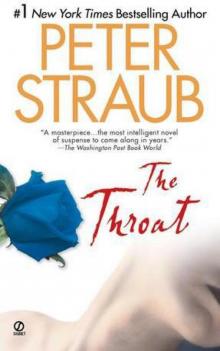 The Throat
The Throat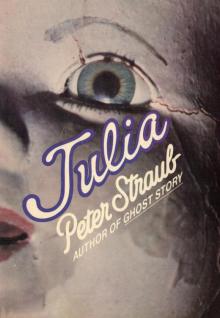 Julia
Julia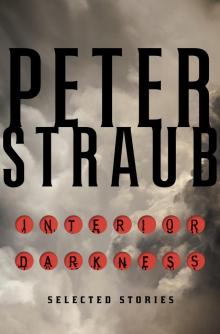 Interior Darkness: Selected Stories
Interior Darkness: Selected Stories A Dark Matter
A Dark Matter Floating Dragon
Floating Dragon Houses Without Doors
Houses Without Doors Mr. X
Mr. X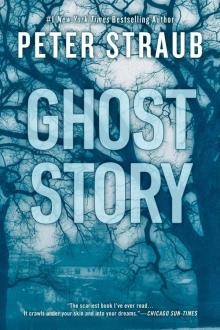 Ghost Story
Ghost Story Mystery
Mystery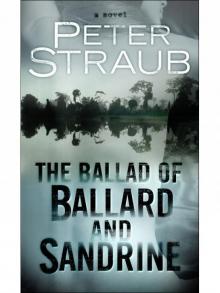 The Ballad of Ballard and Sandrine
The Ballad of Ballard and Sandrine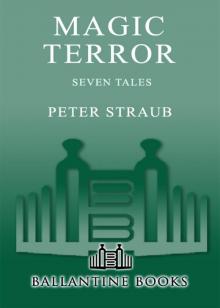 Magic Terror
Magic Terror In the Night Room
In the Night Room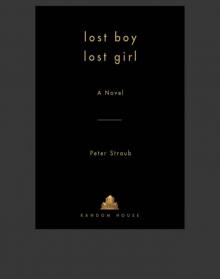 Lost Boy Lost Girl
Lost Boy Lost Girl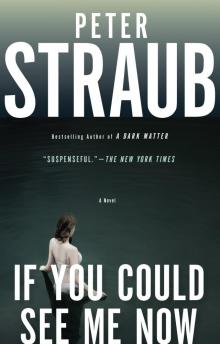 If You Could See Me Now
If You Could See Me Now The Hellfire Club
The Hellfire Club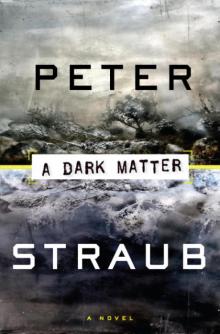 A Dark Matter: A Novel
A Dark Matter: A Novel Koko brt-1
Koko brt-1 Shadowland
Shadowland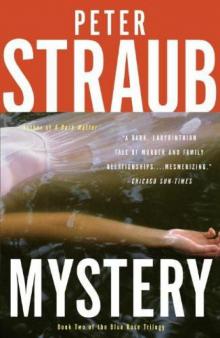 Mystery brt-2
Mystery brt-2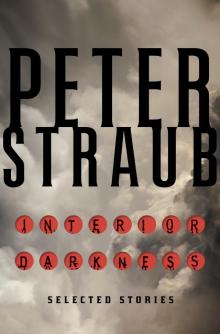 Interior Darkness
Interior Darkness Poe's Children
Poe's Children